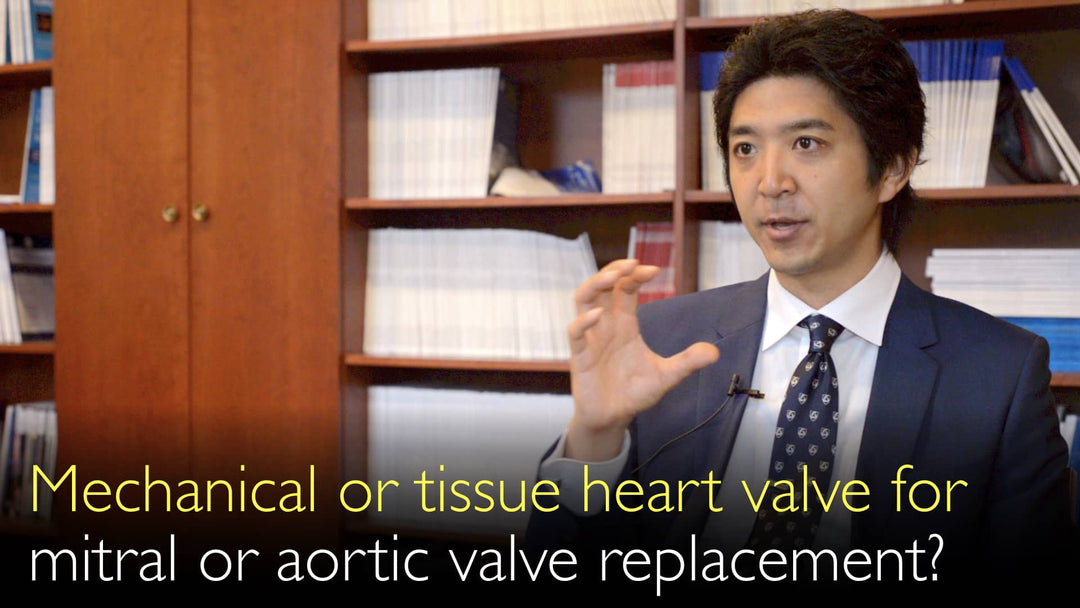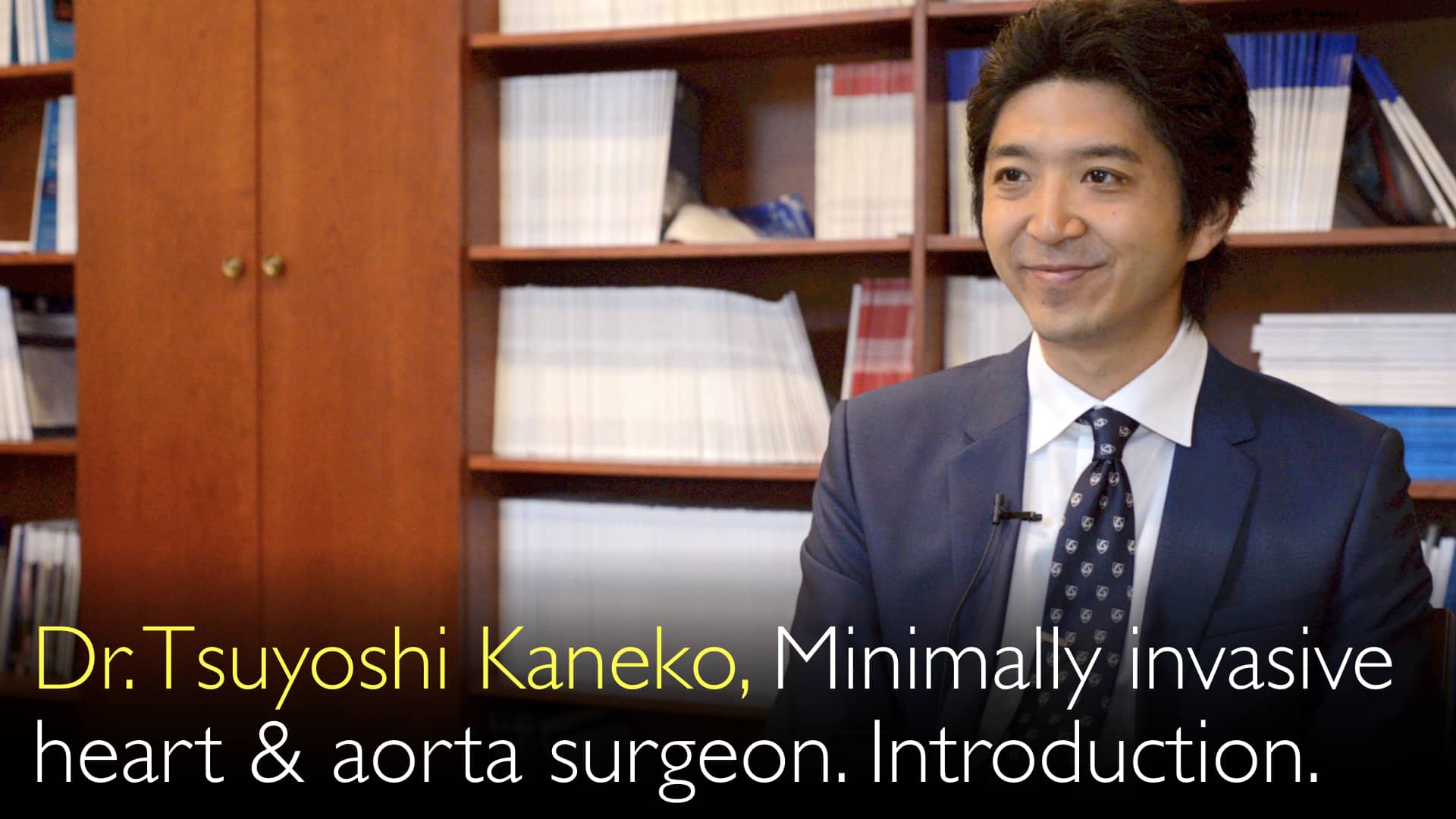מומחה מוביל בכירורגיית לב, ד"ר צויושי קנקו, MD, מסביר את ההחלטה הקריטית בין מסתמים מכניים למסתמים ביולוגיים להחלפת מסתם אבי העורקים או המסתם המיטרלי, ומפרט את העמידות ארוכת הטווח של מסתמים מכניים לעומת החופש מטיפול בנוגדי קרישה שמציעים מסתמים ביולוגיים, וכיצד מגמות מודרניות וזמינותן של פרוצדורות TAVR (החלפת מסתם אבי העורקים בצנתור) משנות את העדפות המטופלים והנחיות הכירורגיה.
בחירה בין מסתמים מכניים למסתמים ביולוגיים: מדריך למטופל
קפיצה לפרק
- מסתמים מכניים לעומת מסתמים ביולוגיים
- יתרונות מסתם מכני ואריכות ימים
- החסרונות של טיפול בנוגדי קרישה עם קומדין
- תוחלת חיים של מסתם ביולוגי וגורמים משפיעים
- שינוי בהנחיות והעדפת המטופל
- השפעת TAVR על בחירת המסתם
- קבלת החלטה מושכלת
מסתמים מכניים לעומת מסתמים ביולוגיים
ניתוח להחלפת מסתם לב מציב בפני המטופלים שתי אפשרויות עיקריות. ד"ר Tsuyoshi Kaneko, MD, מבהיר שהבחירה העיקרית היא בין מסתם לב מכני למסתם לב ביולוגי. מסתם מכני הוא תותב מלאכותי העשוי מחומרי פחמן עמידים. לעומת זאת, מסתם ביולוגי, המכונה גם מסתם ביופרוסטטי, מיוצר מחומרים ביולוגיים. אלה הם בדרך כלל מסתם אבי העורקים של חזיר או רקמת קרום הלב של פרה.
יתרונות מסתם מכני ואריכות ימים
היתרון העיקרי של מסתם לב מכני הוא אריכות החיים יוצאת הדופן שלו. ד"ר Tsuyoshi Kaneko, MD, מדגיש שמסתמים אלה מתוכננים להחזיק מעמד לכל החיים. הצורך להסיר מסתם מכני הוא נדיר מאוד. מצבים כאלה מתרחשים רק במקרים של פקקת מסתם, כאשר קריש דם הופך את המסתם לנייח, או אם התותב נדבק. שיעורי הסיבוכים החמורים האלה נמוכים במיוחד, מה שהופך את המסתם המכני לפתרון אמין מאוד לטווח ארוך להחלפת מסתם אבי העורקים או המסתם המיטרלי.
החסרונות של טיפול בנוגדי קרישה עם קומדין
התמורה המשמעותית לאריכות החיים של המסתם המכני היא הדרישה החובה לטיפול בנוגדי קרישה לכל החיים. ד"ר Tsuyoshi Kaneko, MD, מציין שמטופלים חייבים להתחייב ליטול את התרופה מדללת הדם warfarin, הידועה בשם קומדין. זו אינה תרופה תמימה; הסיכון העיקרי שלה הוא דימום. הנטל של תרופה יומית והצורך הנלווה בניטור דם תכוף לבדיקת רמות הקרישה הם גורם מרכזי בתהליך קבלת ההחלטות של המטופל. הפוטנציאל לאירועי דימום חמורים הוא שיקול מתמיד.
תוחלת חיים של מסתם ביולוגי וגורמים משפיעים
מסתמי לב ביולוגיים מבטלים את הצורך בנוגדי קרישה לטווח ארוך, וזה היתרון הגדול ביותר שלהם. עם זאת, ד"ר Tsuyoshi Kaneko, MD, מסביר שהחיסרון הוא שמסתמים ביולוגיים אלה מתבלים עם הזמן. תוחלת החיים של מסתם ביולוגי אינה קבועה ומשתנה מאוד ממטופל למטופל. גורם מפתח הוא גיל המטופל ורמת הפעילות שלו בזמן ההשתלה. המסתם של מטופל צעיר ופעיל יותר ייפתח וייסגר בתדירות גבוהה יותר, מה שיוביל להידרדרות מבנית מהירה יותר; מסתם מפרה או מחזיר עלול לא להחזיק מעמד אפילו עשר שנים. לעומת זאת, מסתם ביולוגי שהושתל באדם בן 75 שאורח חייו יושבני עשוי לתפקד היטב במשך 15 שנים או יותר.
שינוי בהנחיות והעדפת המטופל
הנחיות כירורגיות היסטוריות התבססו בעיקר על גיל. ד"ר Tsuyoshi Kaneko, MD, קובע שמטופלים בגיל 65 ומטה בדרך כלל הומלצו למסתמים מכניים, בעוד אלה מעל גיל 65 קיבלו מסתמים ביולוגיים. מגמה זו משתנה כעת באופן דרמטי. ההמלצה החזקה ביותר בהנחיות הנוכחיות מאגודות קרדיולוגיה מובילות היא בסופו של דבר העדפת המטופל. לאחר שהוסברו לו thoroughly הסיכונים והיתרונות של כל סוג מסתם, המטופל בוחר את התותב שהכי תואם את אורח חייו ואת ערכיו.
השפעת TAVR על בחירת המסתם
סיבה מרכזית לשינוי זה היא הופעתה של החלפת מסתם אבי העורקים דרך צנתר (Transcatheter Aortic Valve Replacement, TAVR או TAVI). ד"ר Tsuyoshi Kaneko, MD, מדגיש שטכנולוגיה זו מורידה את המכשול לבחירת מסתם ביולוגי. אם מסתם ביולוגי שהושתל בניתוח כושל מאוחר יותר, ניתן לרוב להכניס מסתם חדש בתוך הישן באמצעות הליך TAVR. טכניקת "מסתם בתוך מסתם" זו מבטלת frequently את הצורך בניתוח לב פתוח שני, מה שהופך את תוחלת החיים המוגבלת של מסתם ביולוגי לפחות מאיימת עבור מטופלים צעירים ופעילים המעוניינים להימנע מקומדין.
קבלת החלטה מושכלת
הבחירה בין מסתם לב מכני לביולוגי היא אישית很深. כפי שד"ר Tsuyoshi Kaneko, MD, מסיים, תפקיד הרופא הוא לספק את כל המידע הח crucial regarding אריכות חיים, טיפול בנוגדי קרישה, ואפשרויות עתידיות. המטופל, בייעוץ עם הצוות הרפואי שלו ומשפחתו, מקבל then את ההחלטה הסופית based on הבנה מלאה של how כל סוג של החלפת מסתם אבי העורקים או המסתם המיטרלי will להשפיע על הבריאות ואיכות החיים שלו long-term.
תמליל מלא
Dr. Anton Titov, MD: אפשרויות הטיפול במסתמי לב מתרבות. קיימים תותבים ביולוגיים למסתם המיטרלי ולמסתם אבי העורקים. קיימים מסתמים חליפיים עם שלד וללא שלד. קיימים ניתוח לב פתוח והחלפת מסתם דרך צנתר.
כיצד לבחור את סוג ניתוח הלב הנכון? כיצד לבחור את סוג מסתם הלב החליפי הנכון עבור מטופלים שונים?
מהם היתרונות והסיכונים של כל סוג של ניתוח מסתם לב? כיצד לבחור את מסתם הלב החליפי הנכון?
Dr. Tsuyoshi Kaneko, MD: קיימות now אפשרויות רבות available למטופלים. זו שאלה very טובה. זו also שאלה very קשה.
להתחיל, there are שני סוגים של מסתמי לב חליפיים. I think שזו תהיה התשובה העיקרית לשאלה זו. סוג אחד של מסתם לב נקרא מסתם לב מכני. מסתם מלאכותי זה עשוי מפחמן.
מסתם לב another להחלפה נקרא מסתם ביולוגי. מסתם לב ביולוגי עשוי either ממסתם של חזיר or מרקמת קרום לב של פרה.
היתרון של מסתמים מכניים is this. מסתמי לב מכניים מחזיקים מעמד for a long time after שהשתלתם אותם. There are some situations where you have to להחליף את מסתמי הלב המכניים, but those situations are very rare.
Either מתרחשת פקקת במסתם המיטרלי, מסתמי אבי העורקים נתקעים וצריך to להוציא them, or המסתם אבי העורקים שהוחלף נדבק. Those are the two cases when מסתם מכני will need to להיות מוסר. But שיעורי הבעיות במסתמי לב מכניים are very low.
החיסרון של מסתמים מכניים is that you have to להיות on a מדלל דם. Typically תרופה זו נקראת קומדין. You are committed to a lifetime of שימוש בקומדין. That is the biggest burden of קבלת מסתם לב מכני.
Of course, הסיכון של קומדין is דימום. We will discuss it later, but it's important to note that קומדין is not an innocuous medication. No, it's not.
On the other hand, מסתמי המיטרלי ואבי העורקים הביולוגיים eliminate the need for קומדין. These are מסתמי לב מפרה or מסתמי לב מחזיר.
החיסרון של מסתם ביולוגי is that it does מתבלה with time. It really varies on the time period of how long a מסתם לב חליפי ביולוגי takes to להתבלות.
You משתיל מסתם לב ביולוגי at a younger age. Then המסתם אבי העורקים or המיטרלי opens and closes much more because you are young and you are more active. מסתם מפרה or חזיר may not even להחזיק מעמד עשר שנים.
You may be 75 and you live a very sedentary life. המסתם אבי העורקים החזירי שלך won't open that much. Therefore, מסתם המיטרלי הפרה may להחזיק מעמד up to 15 years. It really varies how long מסתם ביולוגי lasts.
That typically has been one of the deciding factors in the past. For age 65 or younger, patients used to be recommended מסתמי לב מכניים. Anybody above 65 used to get מסתמי לב ביולוגיים, but that trend is changing now for multiple reasons.
Dr. Anton Titov, MD: One is the emergence of TAVR/TAVI. Sometimes you receive a מסתם לב ביולוגי and המסתם מתדרדר. You can get TAVR later on. This eliminates ניתוח לב פתוח. It lowers the hurdle of קבלת מסתמים ביולוגיים.
Second, patients are pursuing active lifestyles. They don't want anticoagulation. It means that a בן 55 who wants to לרכוב על אופניים, who wants to לצאת ולטייל really aggressively.
Dr. Tsuyoshi Kaneko, MD: Those patients do not want קומדין. Those patients are starting to לבחור מסתמי לב ביולוגיים more often.
American Heart Association and American College of Cardiology provides guidelines of what valve to choose. But now the strongest recommendation is העדפת המטופל.
Patients get to לבחור מסתם אבי העורקים or המיטרלי להחלפה based on all the information that they get.
Dr. Anton Titov, MD: The physician has to to provide the important information for the patient. The patients ultimately get to לבחור if they want מסתם לב ביולוגי or מכני for ניתוח החלפה.





